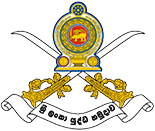“India needs to be constantly cognizant of and concerned with the Sinhala apprehension without sacrificing the right to voice support in a friendly way for whatever genuine human rights concerns there are in the Tamil minority. The Indian Government however needs to rein in the sub-national jingoism that erupts from time to time in Tamil Nadu triggered by slanted English Indian and UK media reports,” Dr Subramanian Swamy, President, Janatha Party of India and India’s former Cabinet Minister of Commerce, Law & Justice told the delegates, attending the final sessions of the ‘Defence Seminar-2013’ on Thursday (5) at Colombo Galadari Hotel.
“However, it is heartening to see some forward movement in the Indo-Sri Lanka interactions to further regional stability following the Trilateral India-Sri Lanka-Maldives Meet at the National Security Adviser level on Maritime Security on July 8, 2013. This needs to be enlarged in the future especially with the participation of the People’s Republic of China, if necessary,” he said.
“May 19 should be remembered every year as V-day for the victory of freedom over despotism. Just two weeks prior to V-day the Sri Lankan President sagaciously had disregarded the call from several countries for a ceasefire, and courageously refused a negotiated settlement before the May 2009 final assault. He thus chose to bring a sordid chapter of terrorism of the most diabolical outfit called the LTTE to a decisive end by military means entailing great sacrifices by the Sri Lankan armed forces, and thus created history in the civil society's global struggle against the evils of fanatic retrograde violence. Several other nations such as India and the US provided support to this war effort of Sri Lanka against a treacherous terrorist outfit,” Dr Swamy added.
Towards the end of his speech to the sessions, Lieutenant General Daya Ratnayake, Commander of the Army signified his contribution to the sessions by awarding a token memento on behalf of the Army.
Here is the full text of his speech;
“The Impact of Post-Conflict Sri Lanka on Regional Stability Subramanian Swamy [Former Cabinet Minister of Commerce, Law& Justice, India]
In May 2009, in the final assault of the Sri Lankan armed forces, a treacherous and murderous terrorist outfit called the Liberation Tigers of Tamil Eelam [LTTE] was decimated. Its Supremo, V. Prabhakaran, and his main associates were killed on May 19, 2009, signaling the end of three decades of a bloody insurgency. May 19 should be remembered every year as V-day for the victory of freedom over despotism.
Just two weeks prior to V-day, the Sri Lankan President Mahinda Rajapakshe sagaciously had disregarded the call from several countries for a ceasefire, and courageously refused a negotiated settlement before the May 2009 final assault.
He thus chose to bring a sordid chapter of terrorism of the most diabolical outfit called the LTTE to a decisive end by military means entailing great sacrifices by the Sri Lankan armed forces, and thus created history in the civil society's global struggle against the evils of fanatic retrograde violence.
The credit therefore for this victory over terrorism naturally must belong largely to the political leadership of the Sri Lankan President Mr. Rajapakshe for his ability to inspire the armed forces to fight on and even suffer death on the battlefield for the cause. Several other nations, such as India and the US, provided support to this war effort of Sri Lanka against a treacherous terrorist outfit.
But in the case of India, as recently confirmed, Sri Lanka had set up a special bilateral six member fully empowered committee of the senior Presidential Adviser, Secretary of the President, and Defence Secretary from the Sri Lankan side, the National Security Adviser, Foreign Secretary and the Defence Secretary from the Indian. side, to deal with "all and the very sensitive Issues"-of the ongoing-military operations "instantly".
Ironically, the ruling coalition ally, the DMK President and Tamil Nadu Chief Minister Mr. Karunanidhi, was kept apprised of the progress in the anti-terrorist operations, including on the then imminent liquidation of LTTE Supremo Prabhakaran and his family. He wisely refrained from intervening on behalf of the LTTE Supremo.
Since the formal end of violent strife on that historic V-day, much has improved for the ordinary citizen in Sri Lanka. Thus, the spate of paralyzing suicide bombings causing killing and maiming of innocent civilians, both Tamils and Sinhalas, in southern parts of the island nation has ended with the decimation of the LTTE.
Today Tamil families in Sri Lanka tell me that they no more fear the so-called Tigers' forced recruitment of their children and their various abuses. The extortion of funds from civilians to finance terrorist operations of the LTTE has also ended. Normalcy in daily life for Tamils thus has returned after three decades.
But of course the aspiration of Tamils for devolution of constitutional power structure within the framework of overriding power of the union government, and within a united Sri Lanka, remains to be fulfilled.
We in India, should the Sri Lanka Parliament so decide, strongly support a Unitary Constitution for Sri Lanka, but with subsidiary federal principles.
Tamils of Sri Lanka are ethnically of the same lineage as Sinhalas. Hence time has come to put an end to outside forces and foreign busy bodies advising the Sri Lanka what to and what not to do.
Tamils therefore should forget that India will ever again intervene in the internal affairs of Sri Lanka, except to raise issues of bilateral agreements and treaty obligations in a friendly way of a cohort and within the SAARC and UN framework.
The misguided activities of fringe groups and low-level knee-jerk competitive politics of parties in Tamil Nadu, are not worth any attention since we mainstream patriotic Indians are clear: We are Indians first and Tamils afterwards.
And hence if there is a conflict of interests between the commitment between sectional and national interests, then Indian national interest will prevail at all costs.
The Indian Constitution mandates that under Articles 247, 256 and 356, and I as a senior Minister in 1991 had enforced those provisions of the Constitution to have the President dismiss the DMK state government and crush the pro-LTTE movement in Tamil Nadu. There is now no overt presence of LTTE anywhere in India.
If necessary, we will again invoke those provisions of the Constitution if it becomes necessary in the future, for which eternal vigilance is essential.
In 1991, I may also remind Sri Lanka, that the then President R. Premadasa did not support India, but in fact gave weapons and money to the LTTE to fight the IPKF which was there as an obligation of a treaty. The assassins of former Prime Minister such as Murugan and suicide bomber had travelled from to and from Sri Lanka a few times prior to the assassination.
Time is at hand to learn from the past as well as bury the bitter memories to move on. Post-Conflict Sri Lanka today is in a position to promote stability specifically in the SAARC region and more generally in the ASEAN area.
The first impact post-conflict is on lndo-Sri Lanka relations because essentially the LTTE was almost as vicious an enemy of India and Indian interests as of Sri Lanka. With the decimation of the LTTE the situation has radically changed. Except for a few who feel financially orphaned by the demise of the LTTE [confined to Tamil Nadu] the Indian people overwhelmingly appreciate and are grateful to the Sri Lankan armed forces and political leadership for ridding India of the LTTE terrorist menace.
No amount of one-sided propaganda in European media and in Tamil secessionist websites on human rights excesses that occurred largely as collateral damage, as it happens in any war. European and Americans cannot claim to be innocent of such collateral damage in the wars they had waged against terrible enemies.
There is a core affinity of the Indian people for Sri Lankans. This affinity has been articulated recently in press statements of by the RSS and India's leader of the Opposition in the Parliament, Ms. Sushma Swaraj [annexed below].
Since India is the only one country in the SAARC region that has common borders with all SAARC countries. Also India's area and population is more than 70% of the South Asian region, hence India has a special responsibility to develop harmonious relations between neighbours with common borders.
The rhetoric on Indo-Sri Lanka relations had been warped by the British version of the history of the peoples of South Asia which portrays the insubstantial differences in languages spoken and written by Sinhalas and Tamil in the island, as due to "ethnic difference" which version has now been rubbished by DNA -genetic and linguistic-studies.
The new scientifically supported view that the peoples of the SAARC nations are intrinsically and substantially of the same ethnicity, has now undermined and weakened the attempts to drive a wedge between Indians and Sri Lankans on bogus racial differences.
Therefore, the support for the so-called "Tamil race" theory and therefore Eelam as a Tamil homeland, has now sharply dwindling support amongst Sri Lankan Tamils and even in fringe groups in Tamil Nadu as the realization of common ancestry grows.
Recently, the Rashtriya Swayamsevak Sangh [RSS] which is a nationalist cultural organization have millions of members from every part of India, passed a Resolution in May 2013 in Jaipur stating:
"It must be borne in mind that this neighbourhood Indian Ocean island with millennia-old linkages with Bharat should not be allowed to become a pawn in the great geo-strategic power game being played out by the global players with the Indian Ocean as the battleground. Attempts to widen the gulf between the Sinhala and Tamil population of that country must not be allowed to -succeed. Therein lies the key to lasting solution to the Sri Lankan issue".
Similarly, as Head of the all party Parliamentary Delegation to Sri Lanka, Ms. Sushma Swaraj who is the Leader of the Opposition in the Lok Sabha in India, and a BJP MP, said on April 21, 2012 in Colombo:
"India and Sri Lanka are bound by ties of history, geography and culture, ....whose destinies are intertwined....I am confident that our shared heritage and common interests will take us forward together".
Thus it is clear that on both sides of mainstream political dividing line, India is united in regarding Sinhalas and Tamils of Sri Lanka equally as siblings of the same heritage, and hence India could not advocate the exclusive cause of either sibling at the expense of the other sibling.
What remains today is a slowly vanishing political breed, those nurtured under British imperialist tutelage such as the waning Dravidian Movement, a movement inspired and financed by the British Imperialists to oppose India's Freedom Movement, who still advocate secession of Tamil Nadu from the Indian Union and of Northern areas of Sri Lanka on the genetically spurious idea that Tamils are a separate race and hence a nation. It is a matter of time before they evaporate faced with a irresistible inclusiveness awareness amongst the people on either side of the Palk Strait and the Gulf of Mannar.
In Sri Lanka about three-fourths of the population is Sinhala that profess Buddhism; Hindu, Christian, Muslims Tamils form twenty four per cent of the population, of which more than twelve per cent are Sri Lankan Tamils whose forefathers have been in the island for over hundreds of years; the rest of them are plantation workers brought over by the British as industrial labour in the last century, plus those Muslims whose mother tongue is Tamil.
Rejecting the ethnicity divide, I and most of my fellow Indians hold that Tamils and Sinhalas are two linguistic communities but not ethnically different. They are of the same DNA genetic structure, and as are all Indians.
Nor can it be said that Hindu and Buddhist religions are, since the last 12 centuries, anymore antagonistic theologies. Buddha was a Hindu by birth, and never repudiated the core concepts of Hinduism. He was a reformer and opposed to orthodoxy. Today Hindus own Buddha as one of their own, and revere and worship Buddha.
The core cause of the Sri Lanka strife is thus not ethnicity or religion as the West is prone to project, but an erroneously perceived distinction in the minds of the Sinhalas and Tamils on a British Imperialist inspired and concocted Aryan-Dravidian race divide.
This concocted difference has accentuated the disaffection caused by the past history of broken agreements between the leaders of the two communities, which agreements were signed to peacefully resolve the problems arising from the Sinhala majority attempts through harsh legislation to rectify the disproportionate share of Tamils in jobs and educational institutions.
Even the linguistic distinction is artificial and contrived. Sinhala and Tamil languages have evolved with deep connection with Sanskrit vocabulary and their respective scripts with Brahmi.
Although the Sinhala community constitutes over 75 per cent of the population of Sri Lanka, it often views the Tamils not as a minority but as part of the looming Tamil political and demographic presence in the Indian peninsular area of Tamil Nadu, with a population of 65+million, and which is seen in Sri Lanka and some parts of the world as the natural support base for Sri Lankan Tamils.
The linguistic political and cultural links due logistically proximate areas that the Sri Lankan Tamils have with Tamil Nadu inhabitants, is seen as dominated by the Dravidian Movement parties, which makes the Sinhalas feel threatened with dismemberment of their country - which the Sinhalas feel could be initiated by India under pressure from its own Tamil citizens and compulsions of coalition politics.
Hence, the Sinhala aversion to respond spontaneously to any just Tamil demand for devolution of power or autonomy.
India needs to be constantly cognizant of, and concerned with this Sinhala apprehension, without sacrificing the right to voice support in a friendly way for whatever genuine human rights concerns there are in the Tamil minority.
The Indian Government however needs to rein in the sub-national jingoism that erupts from time to time in Tamil Nadu triggered by slanted English [Indian and UK] media reports.
Of course in a modern democracy which Sri Lanka is, decision on governance issues are determined by counting heads - as representing "the will of the people", the opinion of the majority of the people. The problem with such a dictum in real life is that if the minority and the majority are mutually antagonistic communities, human rights are threatened if not violated.
While democracy is the rule of the majority, nevertheless in accepted constitutional law, the protection of minorities against injustice and hegemony is not dependent on the compassion of the majority. It definitely is not!
Human rights in a democracy are held to be inalienable - no human being could be deprived of those rights even in a democracy, by the will of the majority of the sovereign people.
This is the basic governance norm of democracy that was forgotten, especially since 1979 in Sri Lanka by the majority and in the unilateral abrogation of pacts of Government-Tamil representatives.
Hence, potentially now the first impact of the post-conflict Sri Lanka on regional stability will be on India. A healthy Indo-Sri Lanka relation would in turn impact the stability of Sri Lanka's relations with many other nations in the region.
But realization of this potential must await the resolution of the issue, and what practically every Indian thinks: viz., whether Sri Lanka be governed under a rigid or under a flexible unitary Constitution, requires to be addressed and settled.
Based on the lndo-Sri Lanka Accord of 1987, and some unilateral commitments made internationally by Sri Lankan elected leaders, India legitimately looks forward to Sri Lankan Parliament to speedily legislate acceptable devolution within an unitary Constitution that has embedded subsidiary federal principles.
Most Indians including in Tamil Nadu are well disposed towards Sri Lanka and take the liberty to articulate this demand, to further promote lndo-Sri Lanka relations as well to ensure that the relations does not get destabilized on an avoidable emotive issue that has been festering since 1948 on an apparent contradiction: Which comes first—meeting the Tamil aspiration for some legitimate devolution or the Sinhala apprehension against facilitating secession under the garb of devolution.
However, it is heartening to see some forward movement in the Indo-Sri Lanka interactions to further regional stability following the Trilateral India-Sri Lanka-Maldives Meet at the National Security Adviser level on Maritime Security on July 8, 2013. This needs to be enlarged in the future especially with the participation of the Peoples Republic of China if necessary.
The second impact possible on regional stability because of the post-conflict situation in Sri Lanka, is a unity of three religious and cultural traditions, namely Buddhist, Confucian, and Hindu that could cement people to people relations amongst Sri Lanka, China, ASEAN and India.
Although these countries are multi-religious, nevertheless the other religions viz., Islam and Christian are relatively small minorities.
Moreover, those professing Islam and Christianity in these three countries are DNA genetic wise the same as the majority and hence share the same cultural ancestry.
Therefore the combining of the three great religious and cultural traditions of Buddhism, Confucianism, and Hinduism is of a threatening development. In fact, culturally even Muslims and Christians of these nations can join if they accept this scientific fact.
Thus, the military victory of the legitimate state of Sri Lanka and its democratically elected government led by President Mahinda Rajapaksha over the illegitimate treacherous and murderous terrorist organization viz., LTTE has opened the possibility of Sri Lanka emerging as a hub of economic and cultural renaissance.
It should not be forgotten that Sri Lanka has the best record in South Asia on the Quality of Life indices and the Human Development index. This automatically makes the island nation an attractive destination for FDI, tourists and international conferences. Stable healthy political normalcy is therefore necessary for Sri Lanka to emerge as a healthy powerhouse of Asia.
For maximum impact on regional stability, Sri Lanka must now resolve the surviving issue of the past conflict, by taking steps for devolution of power in the Constitution according to its own genius.”
“However, it is heartening to see some forward movement in the Indo-Sri Lanka interactions to further regional stability following the Trilateral India-Sri Lanka-Maldives Meet at the National Security Adviser level on Maritime Security on July 8, 2013. This needs to be enlarged in the future especially with the participation of the People’s Republic of China, if necessary,” he said.
“May 19 should be remembered every year as V-day for the victory of freedom over despotism. Just two weeks prior to V-day the Sri Lankan President sagaciously had disregarded the call from several countries for a ceasefire, and courageously refused a negotiated settlement before the May 2009 final assault. He thus chose to bring a sordid chapter of terrorism of the most diabolical outfit called the LTTE to a decisive end by military means entailing great sacrifices by the Sri Lankan armed forces, and thus created history in the civil society's global struggle against the evils of fanatic retrograde violence. Several other nations such as India and the US provided support to this war effort of Sri Lanka against a treacherous terrorist outfit,” Dr Swamy added.
Towards the end of his speech to the sessions, Lieutenant General Daya Ratnayake, Commander of the Army signified his contribution to the sessions by awarding a token memento on behalf of the Army.
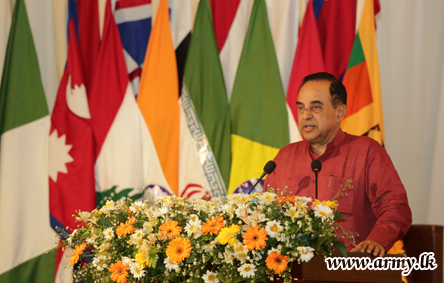 |
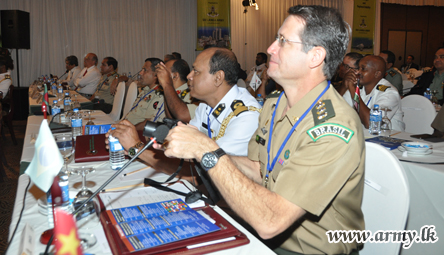 |
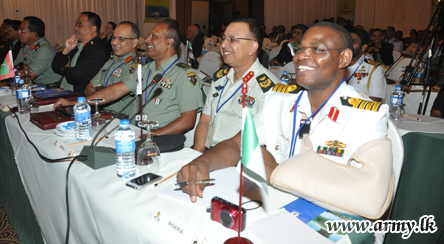 |
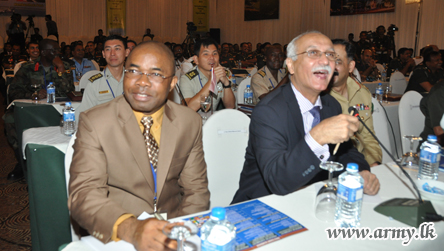 |
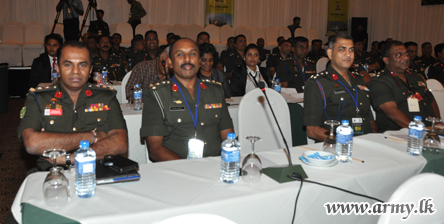 |
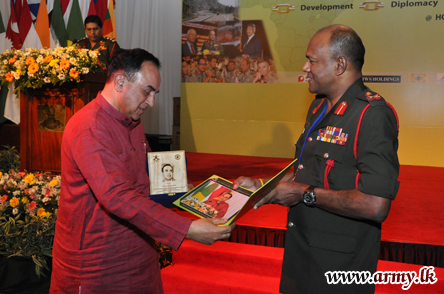 |
Here is the full text of his speech;
“The Impact of Post-Conflict Sri Lanka on Regional Stability Subramanian Swamy [Former Cabinet Minister of Commerce, Law& Justice, India]
In May 2009, in the final assault of the Sri Lankan armed forces, a treacherous and murderous terrorist outfit called the Liberation Tigers of Tamil Eelam [LTTE] was decimated. Its Supremo, V. Prabhakaran, and his main associates were killed on May 19, 2009, signaling the end of three decades of a bloody insurgency. May 19 should be remembered every year as V-day for the victory of freedom over despotism.
Just two weeks prior to V-day, the Sri Lankan President Mahinda Rajapakshe sagaciously had disregarded the call from several countries for a ceasefire, and courageously refused a negotiated settlement before the May 2009 final assault.
He thus chose to bring a sordid chapter of terrorism of the most diabolical outfit called the LTTE to a decisive end by military means entailing great sacrifices by the Sri Lankan armed forces, and thus created history in the civil society's global struggle against the evils of fanatic retrograde violence.
The credit therefore for this victory over terrorism naturally must belong largely to the political leadership of the Sri Lankan President Mr. Rajapakshe for his ability to inspire the armed forces to fight on and even suffer death on the battlefield for the cause. Several other nations, such as India and the US, provided support to this war effort of Sri Lanka against a treacherous terrorist outfit.
But in the case of India, as recently confirmed, Sri Lanka had set up a special bilateral six member fully empowered committee of the senior Presidential Adviser, Secretary of the President, and Defence Secretary from the Sri Lankan side, the National Security Adviser, Foreign Secretary and the Defence Secretary from the Indian. side, to deal with "all and the very sensitive Issues"-of the ongoing-military operations "instantly".
Ironically, the ruling coalition ally, the DMK President and Tamil Nadu Chief Minister Mr. Karunanidhi, was kept apprised of the progress in the anti-terrorist operations, including on the then imminent liquidation of LTTE Supremo Prabhakaran and his family. He wisely refrained from intervening on behalf of the LTTE Supremo.
Since the formal end of violent strife on that historic V-day, much has improved for the ordinary citizen in Sri Lanka. Thus, the spate of paralyzing suicide bombings causing killing and maiming of innocent civilians, both Tamils and Sinhalas, in southern parts of the island nation has ended with the decimation of the LTTE.
Today Tamil families in Sri Lanka tell me that they no more fear the so-called Tigers' forced recruitment of their children and their various abuses. The extortion of funds from civilians to finance terrorist operations of the LTTE has also ended. Normalcy in daily life for Tamils thus has returned after three decades.
But of course the aspiration of Tamils for devolution of constitutional power structure within the framework of overriding power of the union government, and within a united Sri Lanka, remains to be fulfilled.
We in India, should the Sri Lanka Parliament so decide, strongly support a Unitary Constitution for Sri Lanka, but with subsidiary federal principles.
Tamils of Sri Lanka are ethnically of the same lineage as Sinhalas. Hence time has come to put an end to outside forces and foreign busy bodies advising the Sri Lanka what to and what not to do.
Tamils therefore should forget that India will ever again intervene in the internal affairs of Sri Lanka, except to raise issues of bilateral agreements and treaty obligations in a friendly way of a cohort and within the SAARC and UN framework.
The misguided activities of fringe groups and low-level knee-jerk competitive politics of parties in Tamil Nadu, are not worth any attention since we mainstream patriotic Indians are clear: We are Indians first and Tamils afterwards.
And hence if there is a conflict of interests between the commitment between sectional and national interests, then Indian national interest will prevail at all costs.
The Indian Constitution mandates that under Articles 247, 256 and 356, and I as a senior Minister in 1991 had enforced those provisions of the Constitution to have the President dismiss the DMK state government and crush the pro-LTTE movement in Tamil Nadu. There is now no overt presence of LTTE anywhere in India.
If necessary, we will again invoke those provisions of the Constitution if it becomes necessary in the future, for which eternal vigilance is essential.
In 1991, I may also remind Sri Lanka, that the then President R. Premadasa did not support India, but in fact gave weapons and money to the LTTE to fight the IPKF which was there as an obligation of a treaty. The assassins of former Prime Minister such as Murugan and suicide bomber had travelled from to and from Sri Lanka a few times prior to the assassination.
Time is at hand to learn from the past as well as bury the bitter memories to move on. Post-Conflict Sri Lanka today is in a position to promote stability specifically in the SAARC region and more generally in the ASEAN area.
The first impact post-conflict is on lndo-Sri Lanka relations because essentially the LTTE was almost as vicious an enemy of India and Indian interests as of Sri Lanka. With the decimation of the LTTE the situation has radically changed. Except for a few who feel financially orphaned by the demise of the LTTE [confined to Tamil Nadu] the Indian people overwhelmingly appreciate and are grateful to the Sri Lankan armed forces and political leadership for ridding India of the LTTE terrorist menace.
No amount of one-sided propaganda in European media and in Tamil secessionist websites on human rights excesses that occurred largely as collateral damage, as it happens in any war. European and Americans cannot claim to be innocent of such collateral damage in the wars they had waged against terrible enemies.
There is a core affinity of the Indian people for Sri Lankans. This affinity has been articulated recently in press statements of by the RSS and India's leader of the Opposition in the Parliament, Ms. Sushma Swaraj [annexed below].
Since India is the only one country in the SAARC region that has common borders with all SAARC countries. Also India's area and population is more than 70% of the South Asian region, hence India has a special responsibility to develop harmonious relations between neighbours with common borders.
The rhetoric on Indo-Sri Lanka relations had been warped by the British version of the history of the peoples of South Asia which portrays the insubstantial differences in languages spoken and written by Sinhalas and Tamil in the island, as due to "ethnic difference" which version has now been rubbished by DNA -genetic and linguistic-studies.
The new scientifically supported view that the peoples of the SAARC nations are intrinsically and substantially of the same ethnicity, has now undermined and weakened the attempts to drive a wedge between Indians and Sri Lankans on bogus racial differences.
Therefore, the support for the so-called "Tamil race" theory and therefore Eelam as a Tamil homeland, has now sharply dwindling support amongst Sri Lankan Tamils and even in fringe groups in Tamil Nadu as the realization of common ancestry grows.
Recently, the Rashtriya Swayamsevak Sangh [RSS] which is a nationalist cultural organization have millions of members from every part of India, passed a Resolution in May 2013 in Jaipur stating:
"It must be borne in mind that this neighbourhood Indian Ocean island with millennia-old linkages with Bharat should not be allowed to become a pawn in the great geo-strategic power game being played out by the global players with the Indian Ocean as the battleground. Attempts to widen the gulf between the Sinhala and Tamil population of that country must not be allowed to -succeed. Therein lies the key to lasting solution to the Sri Lankan issue".
Similarly, as Head of the all party Parliamentary Delegation to Sri Lanka, Ms. Sushma Swaraj who is the Leader of the Opposition in the Lok Sabha in India, and a BJP MP, said on April 21, 2012 in Colombo:
"India and Sri Lanka are bound by ties of history, geography and culture, ....whose destinies are intertwined....I am confident that our shared heritage and common interests will take us forward together".
Thus it is clear that on both sides of mainstream political dividing line, India is united in regarding Sinhalas and Tamils of Sri Lanka equally as siblings of the same heritage, and hence India could not advocate the exclusive cause of either sibling at the expense of the other sibling.
What remains today is a slowly vanishing political breed, those nurtured under British imperialist tutelage such as the waning Dravidian Movement, a movement inspired and financed by the British Imperialists to oppose India's Freedom Movement, who still advocate secession of Tamil Nadu from the Indian Union and of Northern areas of Sri Lanka on the genetically spurious idea that Tamils are a separate race and hence a nation. It is a matter of time before they evaporate faced with a irresistible inclusiveness awareness amongst the people on either side of the Palk Strait and the Gulf of Mannar.
In Sri Lanka about three-fourths of the population is Sinhala that profess Buddhism; Hindu, Christian, Muslims Tamils form twenty four per cent of the population, of which more than twelve per cent are Sri Lankan Tamils whose forefathers have been in the island for over hundreds of years; the rest of them are plantation workers brought over by the British as industrial labour in the last century, plus those Muslims whose mother tongue is Tamil.
Rejecting the ethnicity divide, I and most of my fellow Indians hold that Tamils and Sinhalas are two linguistic communities but not ethnically different. They are of the same DNA genetic structure, and as are all Indians.
Nor can it be said that Hindu and Buddhist religions are, since the last 12 centuries, anymore antagonistic theologies. Buddha was a Hindu by birth, and never repudiated the core concepts of Hinduism. He was a reformer and opposed to orthodoxy. Today Hindus own Buddha as one of their own, and revere and worship Buddha.
The core cause of the Sri Lanka strife is thus not ethnicity or religion as the West is prone to project, but an erroneously perceived distinction in the minds of the Sinhalas and Tamils on a British Imperialist inspired and concocted Aryan-Dravidian race divide.
This concocted difference has accentuated the disaffection caused by the past history of broken agreements between the leaders of the two communities, which agreements were signed to peacefully resolve the problems arising from the Sinhala majority attempts through harsh legislation to rectify the disproportionate share of Tamils in jobs and educational institutions.
Even the linguistic distinction is artificial and contrived. Sinhala and Tamil languages have evolved with deep connection with Sanskrit vocabulary and their respective scripts with Brahmi.
Although the Sinhala community constitutes over 75 per cent of the population of Sri Lanka, it often views the Tamils not as a minority but as part of the looming Tamil political and demographic presence in the Indian peninsular area of Tamil Nadu, with a population of 65+million, and which is seen in Sri Lanka and some parts of the world as the natural support base for Sri Lankan Tamils.
The linguistic political and cultural links due logistically proximate areas that the Sri Lankan Tamils have with Tamil Nadu inhabitants, is seen as dominated by the Dravidian Movement parties, which makes the Sinhalas feel threatened with dismemberment of their country - which the Sinhalas feel could be initiated by India under pressure from its own Tamil citizens and compulsions of coalition politics.
Hence, the Sinhala aversion to respond spontaneously to any just Tamil demand for devolution of power or autonomy.
India needs to be constantly cognizant of, and concerned with this Sinhala apprehension, without sacrificing the right to voice support in a friendly way for whatever genuine human rights concerns there are in the Tamil minority.
The Indian Government however needs to rein in the sub-national jingoism that erupts from time to time in Tamil Nadu triggered by slanted English [Indian and UK] media reports.
Of course in a modern democracy which Sri Lanka is, decision on governance issues are determined by counting heads - as representing "the will of the people", the opinion of the majority of the people. The problem with such a dictum in real life is that if the minority and the majority are mutually antagonistic communities, human rights are threatened if not violated.
While democracy is the rule of the majority, nevertheless in accepted constitutional law, the protection of minorities against injustice and hegemony is not dependent on the compassion of the majority. It definitely is not!
Human rights in a democracy are held to be inalienable - no human being could be deprived of those rights even in a democracy, by the will of the majority of the sovereign people.
This is the basic governance norm of democracy that was forgotten, especially since 1979 in Sri Lanka by the majority and in the unilateral abrogation of pacts of Government-Tamil representatives.
Hence, potentially now the first impact of the post-conflict Sri Lanka on regional stability will be on India. A healthy Indo-Sri Lanka relation would in turn impact the stability of Sri Lanka's relations with many other nations in the region.
But realization of this potential must await the resolution of the issue, and what practically every Indian thinks: viz., whether Sri Lanka be governed under a rigid or under a flexible unitary Constitution, requires to be addressed and settled.
Based on the lndo-Sri Lanka Accord of 1987, and some unilateral commitments made internationally by Sri Lankan elected leaders, India legitimately looks forward to Sri Lankan Parliament to speedily legislate acceptable devolution within an unitary Constitution that has embedded subsidiary federal principles.
Most Indians including in Tamil Nadu are well disposed towards Sri Lanka and take the liberty to articulate this demand, to further promote lndo-Sri Lanka relations as well to ensure that the relations does not get destabilized on an avoidable emotive issue that has been festering since 1948 on an apparent contradiction: Which comes first—meeting the Tamil aspiration for some legitimate devolution or the Sinhala apprehension against facilitating secession under the garb of devolution.
However, it is heartening to see some forward movement in the Indo-Sri Lanka interactions to further regional stability following the Trilateral India-Sri Lanka-Maldives Meet at the National Security Adviser level on Maritime Security on July 8, 2013. This needs to be enlarged in the future especially with the participation of the Peoples Republic of China if necessary.
The second impact possible on regional stability because of the post-conflict situation in Sri Lanka, is a unity of three religious and cultural traditions, namely Buddhist, Confucian, and Hindu that could cement people to people relations amongst Sri Lanka, China, ASEAN and India.
Although these countries are multi-religious, nevertheless the other religions viz., Islam and Christian are relatively small minorities.
Moreover, those professing Islam and Christianity in these three countries are DNA genetic wise the same as the majority and hence share the same cultural ancestry.
Therefore the combining of the three great religious and cultural traditions of Buddhism, Confucianism, and Hinduism is of a threatening development. In fact, culturally even Muslims and Christians of these nations can join if they accept this scientific fact.
Thus, the military victory of the legitimate state of Sri Lanka and its democratically elected government led by President Mahinda Rajapaksha over the illegitimate treacherous and murderous terrorist organization viz., LTTE has opened the possibility of Sri Lanka emerging as a hub of economic and cultural renaissance.
It should not be forgotten that Sri Lanka has the best record in South Asia on the Quality of Life indices and the Human Development index. This automatically makes the island nation an attractive destination for FDI, tourists and international conferences. Stable healthy political normalcy is therefore necessary for Sri Lanka to emerge as a healthy powerhouse of Asia.
For maximum impact on regional stability, Sri Lanka must now resolve the surviving issue of the past conflict, by taking steps for devolution of power in the Constitution according to its own genius.”
